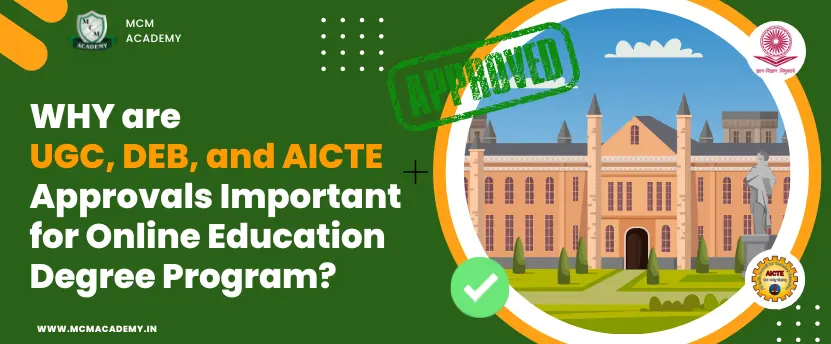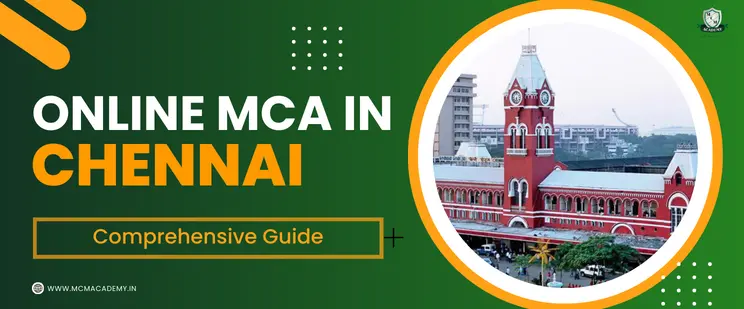If you are a college student or planning to attend college, you have probably heard or read about how students should pursue higher education degree courses at a UGC-approved university or college.
However, you never gave much thought to what UGC-DEB is and why it is so important.
As a result, in the next article, you will find detailed information regarding the UGC-DEB and AICTE. You will also discover why online degree programs and one-year degree programs require UGC-DEB/AICTE approval.
About Online and Distance Education
Online and distance education is a type of education that allows students to learn from the comfort of their own homes. Students can profit from online education in a variety of ways. Online and distance education emerged decades ago and is continually evolving and bringing about new innovations.
The first distance education university in India, Dr. B.R. Ambedkar University, was established in 1982, followed by IGNOU in 1985. Online and distance education was not the same when they were first introduced, as distance universities used to instruct students via mail.
However, with the advent of online education, the market for distance education grew by leaps and bounds. Now, online education and remote education are synonymous, and this online education system has introduced various modern teaching tools.
However, not every university can offer UGC distance education because universities must obtain approval from government bodies such as the University Grants Commission (UGC), the Distance Education Bureau (DEB), and the AICTE.
What is UGC/DEB/AICTE Approval?
The University Grants Commission (UGC) is an authorized body of the Indian government formed under the UGC Act 1956 to preserve the quality of higher education in India. The UGC was founded under the Ministry of Education to ensure that higher education institutes maintain educational standards.
To provide significant and valid degree courses in India, every university must be accredited or recognized by the University Grants Commission.
Distance Education Bureau (DEB):
The Distance Education Bureau is an organization established by the University Grants Commission (UGC) to regulate the standards of open and distance education in India. DEB was formed in 2012 to replace the Distance Education Council (DEC). To deliver online and distance education to students, every university must have DEB approval.
Universities, which the UGC-DEB has recognized, are allowed to offer distance learning courses; otherwise, distant degrees from universities are worthless.
Aicte (All India Council For Technical Education):
The AICTE is an Indian national-level body for technical education that was founded under the Department of higher education. This committee was formed as an advisory council to ensure the appropriate management and development of technical and managerial education in India.
It began as an advisory body, but through a parliamentary act, it was elevated to the position of a statutory entity. This council is in charge of advising and recommending institutions connected with universities.
The government of India has established statutory entities to control and sustain higher education in India in order to maintain standards. Under these bodies, there are various councils, such as the Distance Education Council. Statutory authorities like the UGC and AICTE regulate all higher education institutes.
What is the difference between UGC-approved and AICTE approved?
The UGC and AICTE are two apex organizations in India that serve to higher education.
One of the primary distinctions between the University Grants Commission (UGC) and the All India Council for Technical Education (AICTE) is that the latter focuses on technical education.
The UGC is the highest organization that authorizes universities in the country. The UGC funds affiliated universities and colleges. The UGC-approved means that it holds exams known as NET for the purpose of selecting instructors in colleges. The UGC’s headquarters are in New Delhi, with regional offices in Hyderabad, Pune, Kolkata, Guwahati, Bhopal, and Bangalore. There are many UGC-approved universities in India that provide distance education to students.
The AICTE is just a regulatory agency responsible for coordinating the growth and efficient planning of the country’s technical education system. All engineering, MBA, and pharmacy institutes are affiliated with the All India Council for Technical Education.
The AICTE was founded in November 1945 and is headquartered in New Delhi. The Union Government founded the UGC as a statutory agency in 1956. However, Education, Natural Resources, and Scientific Research Minister Maulana Abul Kalam Azad, formally established the UGC in 1953.
While the AICTE is responsible for technical institutions, the UGC is responsible for all other universities and colleges.
When discussing the functions of the University Grants Commission, the UGC ACT states that the first function is to investigate universities’ financial needs. It then distributes and assigns money to these universities. The other academic functions, on the other hand, come only after these duties. The AICTE ACT, on the other hand, prioritizes conducting surveys in many disciplines of technical education at all levels. This is followed by the allocation and disbursement of monies. There are many AICTE-approved universities that offer distance education.
Another difference is that the UGC is free to do anything it wants, whereas the AICTE is subject to the involvement of the Human Resources Development Ministry.
Why is UGC-DEB/AICTE Important for Distance Education Courses?
The main objective of the UGC-DEB and AICTE is to prevent the growth of bogus or illegal institutes in the country and to provide quality remote education to students. As distance education courses became more popular, many new universities sprang up to provide UGC-approved online degree courses in India. However, not all distance universities provide high-quality distance education services.
As a result, if universities want to provide distance education to their students, they must be recognized by the UGC-DEB. It is the responsibility of distance universities to maintain higher education standards while delivering distance education.
Furthermore, before approving distance universities to offer distance education, the UGC-DEB conducts a thorough inspection. As a result, they examine the infrastructure, faculty, curriculum, personnel, and management standards of a distance education university.
Students who desire to enlist in a bogus or illegal university and complete higher education courses would benefit from this. As a result, if students want their online degree, they must apply solely to UGC-DEB-certified institutions or colleges to get UGC-approved degrees.
Moreover, not every distance college that provides distance education courses needs AICTE approval. Nevertheless, if the AICTE approves them, it can enhance the colleges’ credibility. Additionally, technical institutes approved by the AICTE are affiliated with universities.
FAQs on UGC Approvals
Q1. Why do we need UGC/DEB/AICTE approvals?
Yes, every university must have UGC approval. If a university lacks UGC permission, it is considered fraudulent or illegal.
Q2. Do One Sitting Degree Courses Need to be Approved by UGC-DEB?
Indeed, the UGC-DEB must approve one-sitting degree courses, including distance and online degree courses in India, to be considered valid. If the UGC-DEB does not approve your one-sitting degree, you will not be able to use it to find work.
If you are unfamiliar with the term “one sitting degree,” it is a one-year degree program in which students can complete their three-year or two-year graduating courses in one year at any UGC-approved university. There are also certain particular considerations for choosing a single-sitting degree.
Students who have completed their first or second year in one college and wish to complete their remaining courses in another college, who have a gap of at least three years between their graduation degree and the 12th, or who dropped out in the middle of their graduation course, are therefore eligible to complete their graduation degree courses in one year. Furthermore, at the end of a one-year graduation degree course, students can take all three or two-year exams in a single sitting.
Q3. What does DEB Approval mean?
The University Grants Commission (UGC) established the Distance Education Bureau in 2012 to regulate the standards of open and distance education in India, replacing the Distance Education Council (DEC). To deliver online and distance education to students, every university must have DEB approval.



